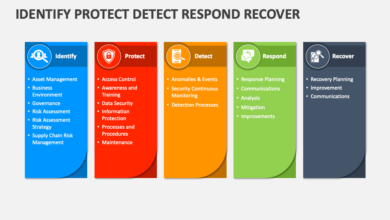
Global Internet Shutdown to Avoid Future Cyber Attacks
Global Internet Shutdown to Avoid Future Cyber Attacks: Imagine a world plunged into digital darkness, a drastic measure taken to prevent catastrophic cyberattacks. Is a global internet shutdown a feasible solution, or a recipe for even greater chaos? This is a question that demands careful consideration, weighing the potential benefits against the devastating consequences for global economies, societies, and political structures.
We’ll explore the logistical nightmares, the economic fallout, the societal upheaval, and ultimately, whether more effective alternatives exist.
The sheer complexity of orchestrating a global internet shutdown is staggering. Think about coordinating across diverse national infrastructures, each with its own unique technological landscape and political priorities. Could a globally coordinated shutdown truly be effective, or would it be riddled with vulnerabilities, leaving critical systems exposed? We’ll delve into the potential economic impacts, examining the ripple effects across various sectors and projecting potential losses.
Then we’ll discuss the societal and political ramifications, considering the ethical implications of limiting access to information and communication technologies. Finally, we’ll explore alternative strategies for cyberattack mitigation, focusing on prevention and response measures that don’t require sacrificing the internet itself.
The Feasibility of Global Internet Shutdowns
The idea of a globally coordinated internet shutdown to prevent large-scale cyberattacks is a fascinating, albeit daunting, prospect. While seemingly a simple solution to a complex problem, the practical realities of implementing such a shutdown present significant logistical and technical hurdles. The sheer scale and interconnected nature of the global internet make it a highly challenging undertaking, raising questions about its feasibility and effectiveness.Logistical Challenges of Global Internet Shutdown ImplementationImplementing a global internet shutdown requires unprecedented international cooperation.
The internet’s decentralized architecture, with diverse national infrastructures and regulatory frameworks, makes coordinating a simultaneous shutdown extremely difficult. Securing agreement among nations with varying geopolitical interests and levels of technological capabilities would be a monumental task. Furthermore, the sheer number of internet service providers (ISPs), network operators, and other stakeholders involved would necessitate a complex and meticulously planned coordination effort.
Even with complete cooperation, enforcing the shutdown across all networks would be a continuous challenge, as workarounds and alternative networks could quickly emerge.Technical Complexities of Global Internet Shutdown CoordinationThe technical complexities involved are equally significant. The internet’s routing protocols, which determine how data packets travel across networks, are designed for redundancy and resilience. Shutting down the internet would require manipulating these protocols on a global scale, a task that is technically challenging and potentially disruptive to critical infrastructure, including financial systems, emergency services, and healthcare.
Furthermore, the diversity of network technologies and protocols in use worldwide would require a highly customized approach, potentially introducing vulnerabilities and unforeseen consequences. The risk of unintended consequences, such as disrupting essential services or creating new avenues for cyberattacks, is substantial.Effectiveness of Global Shutdown versus Targeted, Localized ShutdownsA global shutdown is a blunt instrument compared to targeted, localized shutdowns.
While a global shutdown might temporarily halt some cyberattacks, it would also cripple legitimate internet activity, causing widespread economic disruption and social upheaval. Targeted shutdowns, on the other hand, allow for a more precise response, focusing on specific networks or regions affected by a cyberattack. This approach minimizes collateral damage while addressing the immediate threat. The 2007 Estonian cyberattacks, for example, highlighted the effectiveness of targeted responses, with Estonia successfully mitigating the attacks without resorting to a nationwide internet shutdown.Hypothetical Framework for a Global Internet Shutdown and its VulnerabilitiesA hypothetical framework for a global internet shutdown would necessitate a global governing body with the authority to coordinate the shutdown across all nations.
This body would need to establish clear protocols for initiating and terminating the shutdown, ensuring minimal disruption to critical infrastructure. It would also require a robust monitoring system to detect and respond to cyber threats in real-time. However, such a framework is inherently vulnerable to several weaknesses. The potential for abuse by authoritarian regimes is significant, as is the risk of unintended consequences.
Furthermore, the technical challenges of implementing and maintaining such a system, coupled with the possibility of circumvention, make its long-term viability questionable. The existence of darknets and other decentralized networks would further complicate efforts to enforce a complete shutdown.
Economic Impacts of a Global Internet Shutdown
A global internet shutdown would trigger a catastrophic economic downturn, far exceeding the impact of any previous global crisis. The interconnected nature of modern economies means that even a brief disruption would have cascading effects, impacting virtually every sector and leaving a long-lasting scar on the global financial landscape. The scale of the economic devastation is difficult to fully quantify, but even conservative estimates point to trillions of dollars in losses and widespread societal disruption.
Impact on Global Trade, Global internet shutdown to avoid future cyber attacks
The instantaneous nature of global trade relies heavily on the internet. A shutdown would immediately halt the flow of goods and services, disrupting supply chains and causing significant delays. E-commerce, a multi-trillion-dollar industry, would grind to a halt, leading to massive losses for businesses and consumers alike. Real-time tracking of shipments, crucial for logistics and inventory management, would become impossible, leading to shortages and price increases.
The impact would be particularly severe on businesses that rely heavily on just-in-time inventory management, leading to production halts and potential bankruptcies. The 2021 Suez Canal blockage, which disrupted global trade for weeks, offers a glimpse into the potential scale of disruption a global internet shutdown could cause, albeit on a smaller scale.
Impact on Global Finance
The global financial system is inextricably linked to the internet. A shutdown would immediately cripple stock markets, halt electronic payments, and disrupt banking operations. International transactions would cease, leaving businesses and individuals unable to access their funds. The inability to process payments would disrupt supply chains and create significant liquidity problems. The ripple effect would be felt across all financial markets, potentially triggering a global financial crisis.
The 2008 financial crisis, which was partly caused by the interconnectedness of the global financial system, provides a sobering example of the potential for widespread economic collapse.
The idea of a global internet shutdown to prevent massive cyberattacks is extreme, but the increasing sophistication of threats makes it a topic worth considering. However, a more proactive approach involves strengthening our digital defenses, and that’s where solutions like bitglass and the rise of cloud security posture management become crucial. By improving cloud security, we can significantly reduce the risk of future attacks, making drastic measures like a global shutdown less necessary.
Impact on Communication Systems
The internet is the backbone of modern communication systems. A shutdown would severely hamper communication between businesses, governments, and individuals. Emergency services would be significantly impacted, hindering their ability to respond to crises. The inability to communicate effectively would lead to widespread confusion and chaos, potentially exacerbating the economic consequences of the shutdown. The impact would be especially severe in developing countries, where internet access is often the primary means of communication.
Consider the challenges faced during natural disasters where communication networks are disrupted; a global internet shutdown would magnify these challenges exponentially.
Projected Economic Losses
The following table provides a preliminary estimate of the potential economic losses resulting from a global internet shutdown. These figures are based on various reports and analyses and should be considered as conservative estimations given the complexity and unprecedented nature of such an event.
| Region | Industry | Estimated Loss (USD) | Percentage Decrease |
|---|---|---|---|
| North America | Technology | $5 trillion | 50% |
| Europe | Finance | $3 trillion | 40% |
| Asia | Manufacturing | $4 trillion | 30% |
| Global | E-commerce | $2 trillion | 75% |
Potential for Long-Term Economic Instability
A global internet shutdown would not only cause immediate economic devastation but could also lead to long-term economic instability. The disruption to supply chains, the loss of confidence in financial markets, and the damage to global communication systems could take years to repair. The resulting economic downturn could lead to widespread unemployment, social unrest, and geopolitical instability. The long-term consequences could be even more severe than the immediate impact, potentially reshaping the global economic landscape for decades to come.
The Great Depression, which lasted for a decade, serves as a stark reminder of the potential for long-term economic instability following a major economic shock.
Societal and Political Ramifications
A global internet shutdown, while potentially mitigating some cyber threats, would trigger a cascade of societal and political repercussions far outweighing the perceived benefits. The interconnected nature of our modern world makes such a drastic measure incredibly disruptive, impacting everything from daily life to international relations. The ramifications are complex and far-reaching, necessitating a careful consideration of the potential consequences before even contemplating such an action.The immediate and most significant impact would be the disruption of access to information and communication.
This would disproportionately affect vulnerable populations, hindering access to essential services like healthcare, education, and emergency response. Furthermore, the free flow of information, crucial for a functioning democracy, would be severely curtailed, potentially leading to increased misinformation and the spread of propaganda. The economic consequences, while already discussed, would exacerbate these societal issues, leading to widespread instability and unrest.
Societal Disruptions from Information and Communication Access Loss
A global internet shutdown would create a digital dark age, impacting nearly every aspect of modern life. Imagine hospitals unable to access critical medical databases, businesses unable to conduct transactions, and individuals cut off from their loved ones. The loss of access to news and information would leave populations vulnerable to manipulation and misinformation, potentially fueling social unrest and political instability.
The educational system would be severely hampered, as online learning platforms and research resources become inaccessible. The economic impact would be devastating, crippling global commerce and exacerbating existing inequalities. Consider the reliance of many businesses on online platforms – a shutdown would lead to immediate and significant losses. For instance, the global e-commerce industry, valued in trillions of dollars, would grind to a halt.
This isn’t just about online shopping; it encompasses a vast network of businesses reliant on digital infrastructure.
Political Implications of a Global Internet Shutdown
The political ramifications of a global internet shutdown are equally profound. National sovereignty would be challenged, as the decision to shut down the internet would require unprecedented international cooperation – a feat fraught with political complexities and disagreements. The potential for abuse of power is significant; governments could use a shutdown as a tool for censorship and control, suppressing dissent and limiting freedom of expression.
International treaties and agreements concerning freedom of speech and access to information would be severely tested. The lack of a globally agreed-upon mechanism for such a decision would inevitably lead to conflicts and power struggles between nations. A precedent for such a drastic measure could also embolden authoritarian regimes to implement similar shutdowns within their own borders, further eroding democratic principles.
Potential Responses from Civil Society and International Organizations
The potential for a global internet shutdown necessitates a proactive approach from civil society and international organizations. A coordinated response is crucial to mitigate the negative consequences.
- International pressure campaigns: Civil society organizations and international bodies could launch concerted campaigns to pressure governments against implementing a global internet shutdown, highlighting the human rights implications.
- Development of alternative communication networks: The creation and strengthening of decentralized and resilient communication networks, such as mesh networks, would provide alternative channels for information sharing in the event of a shutdown.
- Legal challenges: International legal frameworks could be invoked to challenge the legality and legitimacy of a global internet shutdown, based on human rights principles and international law.
- Public awareness campaigns: Raising public awareness about the risks and consequences of a global internet shutdown is crucial to build opposition and mobilize support for alternative solutions.
- Technological innovation: Investing in technologies that enhance internet resilience and security, making it more difficult to shut down, is a vital long-term strategy.
Ethical Considerations of Limiting Access to ICTs
The ethical implications of limiting access to information and communication technologies are significant. Such actions violate fundamental human rights, including freedom of expression, access to information, and the right to participate in public life. The potential for discrimination and marginalization of vulnerable populations is high. A global internet shutdown would disproportionately impact those who rely on the internet for essential services, further exacerbating existing inequalities.
The ethical justification for such a drastic measure would need to be exceptionally compelling, considering the potential harm to human rights and societal well-being. The principle of proportionality – that the means used to achieve a goal must be proportionate to the harm prevented – would be critically examined in such a scenario. A global internet shutdown would likely fail this test.
The idea of a global internet shutdown to prevent massive cyberattacks is unsettling, but the increasing sophistication of these attacks makes it a topic worth considering. Building robust, secure applications is key, and that’s where exploring options like domino app dev the low code and pro code future becomes crucial. Ultimately, a resilient digital infrastructure, built with secure coding practices, might be our best defense against the need for such drastic measures.
Alternative Strategies for Cyberattack Mitigation

The global internet shutdown, while seemingly a drastic solution to widespread cyberattacks, presents insurmountable economic and societal challenges. Fortunately, a range of alternative strategies exist that offer more nuanced and effective approaches to preventing and mitigating cyber threats without crippling global communication. These strategies focus on proactive defense, robust response mechanisms, and international collaboration, prioritizing the prevention and containment of attacks over the blunt instrument of a complete shutdown.
A multifaceted approach is crucial, encompassing technological advancements, policy changes, and international cooperation. Simply improving firewalls or employing more sophisticated antivirus software is insufficient; a comprehensive strategy needs to consider the entire ecosystem, from individual users to global infrastructure.
Seriously considering a global internet shutdown to prevent massive cyberattacks feels extreme, but when you see stuff like facebook asking bank account info and card transactions of users , you start to wonder. It highlights how vulnerable our online data is, making a temporary shutdown to rebuild security seem less crazy. Maybe a temporary internet blackout is a drastic but necessary measure to avoid a much larger catastrophe.
Enhanced Network Security Protocols
Strengthening network security protocols is paramount. This involves implementing multi-factor authentication, robust encryption methods, and regular security audits across all systems. Outdated software and hardware are significant vulnerabilities, and a commitment to continuous updates and patching is vital. For example, the implementation of strong password policies and the widespread adoption of protocols like HTTPS significantly reduce the risk of data breaches and unauthorized access.
Furthermore, moving towards a zero-trust security model, where every user and device is verified before access is granted, regardless of location, significantly enhances security. The inherent disadvantage lies in the significant investment required for implementation and ongoing maintenance, along with the potential for increased complexity that can hinder operational efficiency.
International Cooperation in Cybersecurity
Effective cybersecurity requires global collaboration. Sharing threat intelligence, coordinating responses to large-scale attacks, and establishing common standards and best practices are essential. The creation of international task forces and information-sharing platforms allows for a faster and more effective response to emerging threats. However, differing national interests and legal frameworks can hinder the seamless flow of information and coordinated action.
A successful example of international cooperation is the efforts made by various governments and organizations to combat ransomware attacks, through initiatives like the creation of joint task forces and the sharing of intelligence to identify and disrupt criminal networks. Challenges include differing levels of cybersecurity expertise and resources across nations, as well as potential conflicts in national security interests.
Comprehensive Cybersecurity Strategy: Prevention and Response
A comprehensive cybersecurity strategy should prioritize prevention and rapid response. This includes: investing in robust security infrastructure, implementing stringent access controls, conducting regular security assessments and penetration testing, developing incident response plans, and establishing strong data backup and recovery mechanisms. Furthermore, educating users about phishing scams, malware, and other common cyber threats is crucial. This multifaceted approach minimizes the likelihood of successful attacks and ensures a swift and effective response if an attack does occur.
A strong emphasis on employee training, coupled with robust security protocols, is key to mitigating insider threats. The challenge lies in maintaining a balance between security and usability, avoiding overly restrictive measures that hinder productivity. The successful implementation of a multi-layered security approach by a major financial institution, which prevented a large-scale data breach by detecting and neutralizing a sophisticated phishing campaign, illustrates the effectiveness of a well-designed and executed strategy.
Examples of Successful Cybersecurity Initiatives
Several governments and organizations have successfully implemented robust cybersecurity initiatives. Estonia, for instance, has invested heavily in its cybersecurity infrastructure and developed a strong national cybersecurity strategy, including robust incident response capabilities. Similarly, many large corporations, like Google and Microsoft, have dedicated teams focused on threat intelligence and proactive security measures, continuously updating their systems and developing advanced detection and response mechanisms.
These initiatives demonstrate that a proactive, multi-layered approach can significantly reduce the vulnerability to cyberattacks. The challenge, however, is the continuous adaptation to evolving threat landscapes and the constant need for upgrading security measures to stay ahead of attackers.
The Role of International Cooperation

International collaboration is paramount in the face of escalating global cybersecurity threats. The interconnected nature of the internet means that a cyberattack in one nation can quickly ripple across borders, impacting critical infrastructure, economies, and even national security worldwide. Therefore, a unified, globally coordinated approach is not merely desirable, but essential for building a truly resilient and secure digital ecosystem.International agreements and treaties can establish crucial norms of behavior in cyberspace, providing a framework for cooperation and accountability.
These legal instruments can define what constitutes a cyberattack, Artikel obligations for states to prevent and respond to such attacks, and establish mechanisms for information sharing and mutual assistance. Such agreements could help harmonize differing national approaches to cybersecurity, fostering a more unified and effective response to global threats.
Obstacles to International Cooperation in Cybersecurity
Differing national interests and regulatory frameworks present significant obstacles to effective international cooperation in cybersecurity. National sovereignty concerns often lead countries to resist international oversight or interference in their domestic cybersecurity policies. Furthermore, variations in legal systems, technical capabilities, and even definitions of cybercrime can create friction and hinder the development of universally applicable agreements and mechanisms. For instance, some nations may prioritize national security interests above international cooperation, leading to a reluctance to share sensitive intelligence or cooperate in investigations.
Likewise, varying legal interpretations of data privacy and surveillance can complicate international collaborations, especially in the context of cross-border cybercrime investigations.
A Scenario Illustrating Effective International Cooperation
Imagine a coordinated, large-scale Distributed Denial of Service (DDoS) attack targeting global financial institutions. Under a robust international cooperation framework, the following sequence of events could unfold: Initially, advanced threat detection systems in multiple countries, interconnected through a pre-established international information-sharing network, simultaneously identify the attack’s origin and characteristics. This rapid detection is facilitated by shared threat intelligence platforms and standardized reporting procedures, agreed upon through prior international treaties.
Next, member states with relevant expertise and capabilities swiftly mobilize their resources to mitigate the attack. This coordinated response might involve sharing network traffic data to identify attack vectors, deploying countermeasures to neutralize the DDoS traffic, and collaborating on forensic investigations to trace the perpetrators. Simultaneously, international law enforcement agencies, working through pre-established channels and legal frameworks, collaborate to identify and apprehend the individuals or groups responsible.
This coordinated, multi-national response effectively neutralizes the attack with minimal disruption, showcasing the power of international cooperation in preventing and responding to large-scale cyberattacks without resorting to drastic measures like internet shutdowns. The success hinges on trust, established protocols, and the commitment of participating nations to shared cybersecurity goals.
Final Review: Global Internet Shutdown To Avoid Future Cyber Attacks
The prospect of a global internet shutdown to prevent cyberattacks is a double-edged sword. While the intent is noble – protecting critical infrastructure and preventing widespread damage – the potential consequences are equally, if not more, devastating. The economic and societal disruptions, coupled with the ethical concerns surrounding information access, make it a highly problematic solution. A far more effective approach lies in proactive cybersecurity measures, international cooperation, and a focus on prevention rather than drastic, last-resort shutdowns.
The future of online security depends not on silencing the internet, but on strengthening it against the ever-evolving threats of the digital age.
Essential FAQs
What are some examples of successful cybersecurity initiatives?
Many governments and organizations employ multi-layered security systems including intrusion detection systems, regular security audits, employee training on cybersecurity best practices, and incident response plans. Successful initiatives often involve a combination of these approaches tailored to specific needs.
Who would be responsible for implementing a global internet shutdown?
There’s no single entity with the authority to implement a global internet shutdown. It would require unprecedented international cooperation and agreement, a highly unlikely scenario given differing national interests and technological capabilities.
Could a localized internet shutdown be more effective?
Targeted shutdowns, while less disruptive than a global one, still carry significant risks and might not be effective in preventing sophisticated cyberattacks that can spread rapidly across different networks.
What role does the private sector play in cyberattack prevention?
The private sector plays a crucial role. Companies need robust cybersecurity measures, and collaboration among companies and with governments is essential for sharing threat intelligence and coordinating responses.





